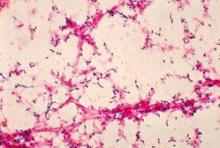STANFORD, CALIF. – A huge drop in U.S. cases of invasive pneumococcal disease in infants younger than 2 years bodes well for possible similar trends in older age groups.
Preliminary data not yet published by the Centers for Disease Control and Prevention suggest that only 40 cases of invasive pneumococcal disease with serotypes covered by the previous vaccine were reported in infants under 2 years of age in 2011, Dr. Yvonne "Bonnie" Maldonado said at Stanford University’s pediatric update.
That’s a big, "exciting" drop from nearly 140-180 cases in infants under 2 years of age reported in each of 2006, 2007, 2008, and 2010, and it is most likely due to the introduction of the 13-valent pneumococcal conjugate vaccine (PCV13) in 2010, said Dr. Maldonado, chief of pediatric infectious disease, and professor of pediatrics and of health research and policy at the university.
The previous PCV7 vaccine, introduced in 2000, lost some effectiveness over time as some covered serotypes mutated, and serotypes that were not included in the vaccine became more prominent.
With the introduction of the PCV13 vaccine, rates of invasive pneumococcal disease in this young age group "really dropped off dramatically," she said. "It bodes very well for our ability to significantly reduce the amount of pneumococcal disease in the population."
Data for cases of invasive pneumococcal disease in 2009 were not included in the analysis because pandemic influenza contributed to so many cases that year, she said.
The CDC now is analyzing data on invasive pneumococcal disease in age groups older than 2 months in 2011.
"I suspect that what’s going to happen, because it did happen with the PCV7 vaccine, is that you’re going to see this herd immunity affect older populations as well," she said.
Dr. Maldonado has been a speaker for Merck and Novartis.



